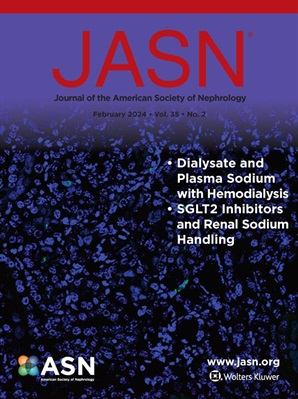他汀类药物对肾衰竭患者的长期益处和安全性:目标试验模拟研究
IF 10.3
1区 医学
Q1 UROLOGY & NEPHROLOGY
引用次数: 0
摘要
背景:肾衰竭患者罹患心血管疾病的风险较高。虽然他汀类药物通常用于降低高危人群的心血管疾病风险,但在肾衰竭患者中开始他汀类药物治疗的证据仍不明确。本研究旨在调查他汀类药物治疗对肾衰竭患者的长期益处和相关风险:利用全港公共电子健康记录,对2008年1月至2015年12月期间3019名符合他汀类药物治疗条件的肾衰竭患者和低密度脂蛋白胆固醇升高≥100 mg/dL的患者进行分析。采用目标试验仿真框架,研究他汀类药物启动者与非他汀类药物启动者之间主要心血管疾病(即心肌梗死、心力衰竭和中风的综合征)、全因死亡率以及主要不良事件(即肌病和肝功能异常)的风险。在意向治疗(ITT)分析和每方案(PP)分析中,采用集合逻辑模型得出相关结果的危险比(HRs):主要心血管疾病(ITT:0.78 [0.62, 0.98];PP:0.66 [0.50, 0.87])和全因死亡率(ITT:0.80 [0.68, 0.95];PP:0.60 [0.48, 0.76])与他汀类药物治疗相关的风险显著降低(HR [95%CI])。在按方案分析中,5年和10年的标准化绝对风险降低率分别为7%(3%,11%)和11%(4%,18%)。未观察到重大不良事件的显著风险:他汀类药物治疗可降低肾衰竭患者的心血管疾病风险和全因死亡率,但不会增加主要不良事件的风险。本文章由计算机程序翻译,如有差异,请以英文原文为准。
Long-Term Benefits and Safety of Statins in Patients with Kidney Failure: A Target Trial Emulation Study.
求助全文
通过发布文献求助,成功后即可免费获取论文全文。
去求助
来源期刊
CiteScore
22.40
自引率
2.90%
发文量
492
审稿时长
3-8 weeks
期刊介绍:
The Journal of the American Society of Nephrology (JASN) stands as the preeminent kidney journal globally, offering an exceptional synthesis of cutting-edge basic research, clinical epidemiology, meta-analysis, and relevant editorial content. Representing a comprehensive resource, JASN encompasses clinical research, editorials distilling key findings, perspectives, and timely reviews.
Editorials are skillfully crafted to elucidate the essential insights of the parent article, while JASN actively encourages the submission of Letters to the Editor discussing recently published articles. The reviews featured in JASN are consistently erudite and comprehensive, providing thorough coverage of respective fields. Since its inception in July 1990, JASN has been a monthly publication.
JASN publishes original research reports and editorial content across a spectrum of basic and clinical science relevant to the broad discipline of nephrology. Topics covered include renal cell biology, developmental biology of the kidney, genetics of kidney disease, cell and transport physiology, hemodynamics and vascular regulation, mechanisms of blood pressure regulation, renal immunology, kidney pathology, pathophysiology of kidney diseases, nephrolithiasis, clinical nephrology (including dialysis and transplantation), and hypertension. Furthermore, articles addressing healthcare policy and care delivery issues relevant to nephrology are warmly welcomed.

 求助内容:
求助内容: 应助结果提醒方式:
应助结果提醒方式:


